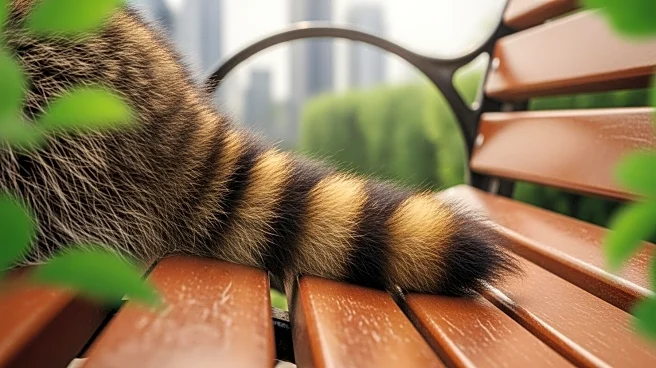What's Happening?
A recent study published in the journal Frontiers in Zoology has revealed that raccoons living in urban environments are exhibiting early signs of domestication. The research, led by zoologist Raffaela
Lesch from the University of Arkansas Little Rock, focused on the physical and behavioral changes in raccoons that are typically associated with domesticated animals. These changes include shorter snouts, reduced fear responses, and other traits commonly seen in household pets like dogs. The study analyzed photos from the citizen-science app iNaturalist, finding that raccoons in densely populated areas have snouts approximately 3.5% shorter than those in rural areas. This adaptation is believed to be driven by the raccoons' proximity to human environments, where they often forage for food in dumpsters. The findings suggest that natural selection is favoring traits that allow raccoons to better exploit human environments.
Why It's Important?
The potential domestication of raccoons could have significant implications for urban wildlife management and pet ownership trends in the U.S. As raccoons become less aggressive and more accustomed to human presence, they may increasingly be seen as viable pets, similar to dogs and cats. This shift could lead to changes in how cities manage raccoon populations, including considerations for rabies vaccination and other health measures. Additionally, the study highlights the broader impact of urbanization on wildlife, as animals adapt to new environments created by human activity. This could influence future research on urban ecology and the evolution of other species living in close proximity to humans.
What's Next?
As raccoons continue to adapt to urban environments, there may be increased interest in their potential as domesticated pets. This could lead to new regulations and guidelines for raccoon ownership, as well as further studies on their behavior and health needs. Cities may also need to consider additional measures to manage raccoon populations, such as expanded vaccination programs to prevent the spread of diseases like rabies. The ongoing adaptation of raccoons to urban life may also prompt further research into the domestication processes of other wildlife species.
Beyond the Headlines
The domestication of raccoons raises ethical and ecological questions about human influence on wildlife. As raccoons become more integrated into human environments, there is a risk of disrupting local ecosystems and altering the natural behaviors of these animals. This development also highlights the broader impact of urbanization on biodiversity, as species adapt to survive in human-dominated landscapes. Understanding these dynamics is crucial for developing sustainable urban planning and wildlife conservation strategies.










